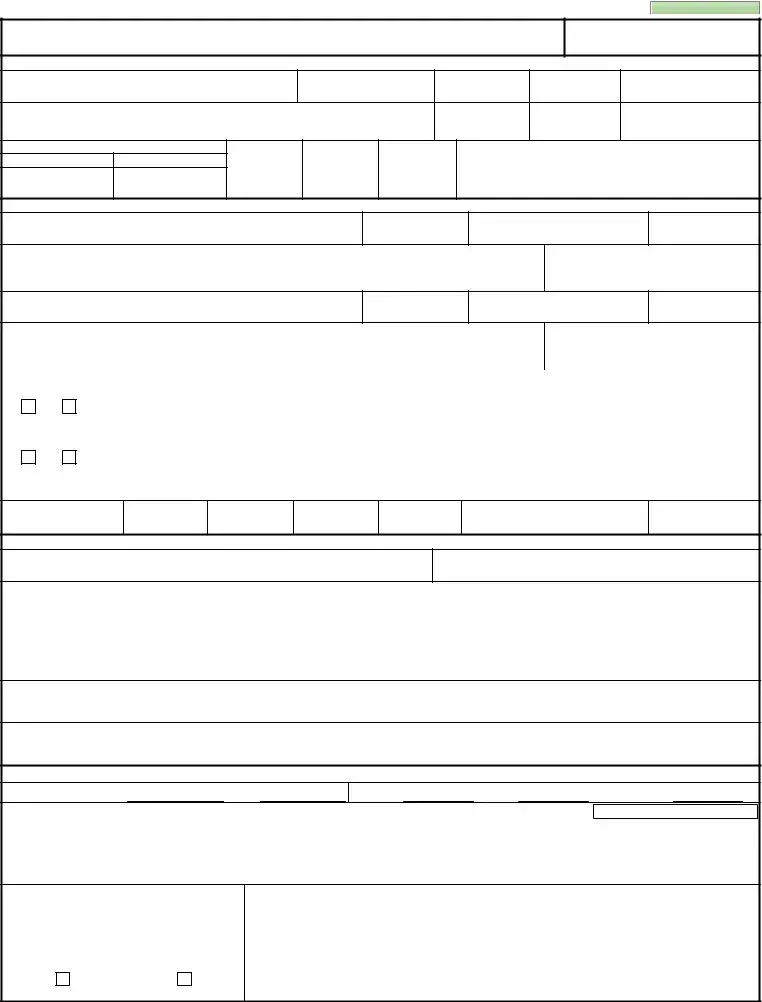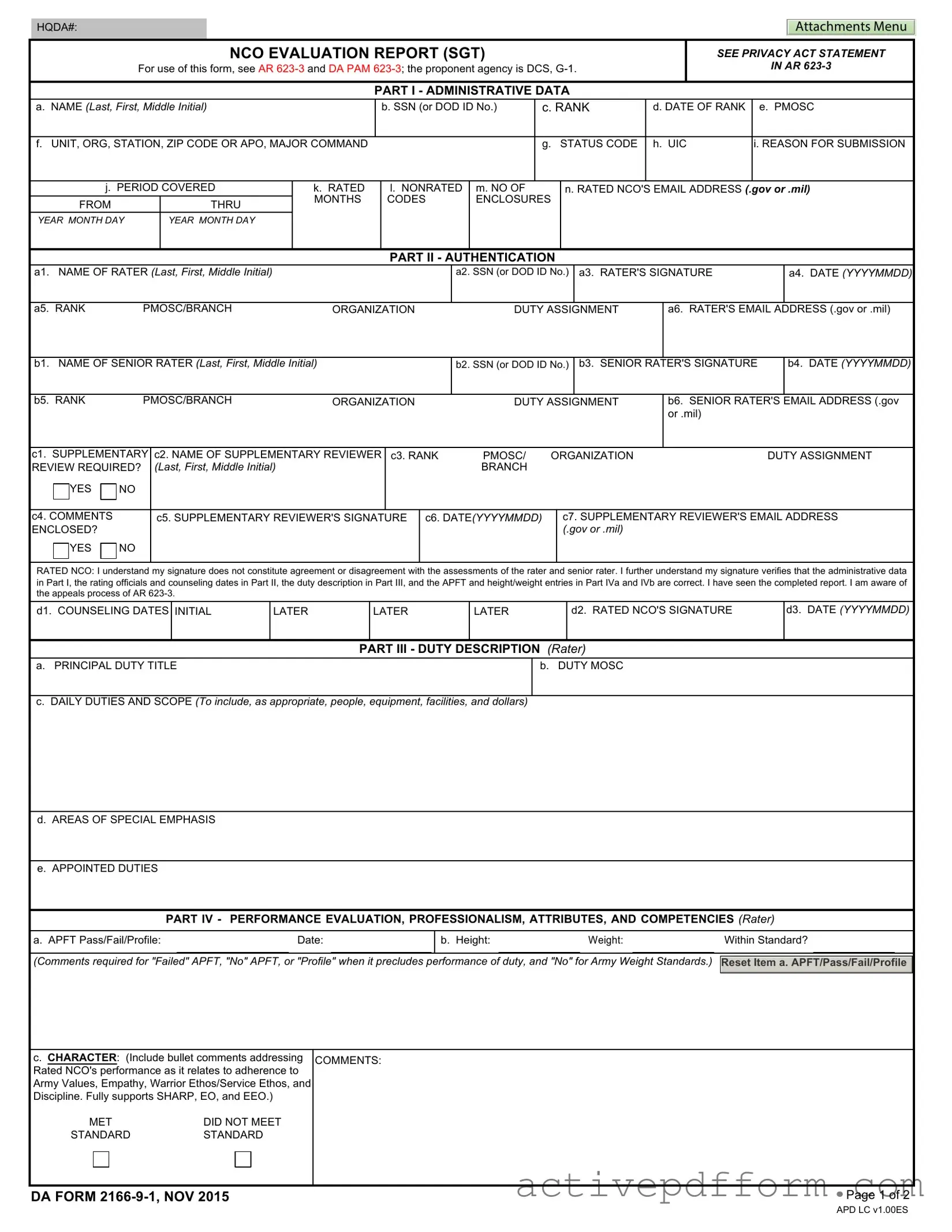Free Da 2166 9 1 Template
The DA 2166-9-1 form serves as a critical tool for evaluating the performance and potential of non-commissioned officers (NCOs) in the United States Army. This evaluation report is specifically designed for sergeants and plays a vital role in the Army's personnel management system. It encompasses several key sections that ensure a comprehensive assessment of an NCO's capabilities and contributions. The form includes administrative data, such as the NCO's name, Social Security number, rank, and unit information, which establishes the context for the evaluation. Furthermore, it requires authentication from the rater and senior rater, ensuring that the assessment is credible and reflects multiple perspectives. The evaluation itself covers various aspects of performance, including character, presence, intellect, leadership, development, and achievement, each assessed against established standards. The rater provides detailed comments that highlight the NCO's strengths and areas for improvement, fostering a culture of feedback and professional growth. Additionally, the senior rater assesses the NCO's overall potential compared to peers, which can significantly influence career progression and opportunities for advancement. Understanding the DA 2166-9-1 form is essential for both evaluators and those being evaluated, as it not only shapes individual careers but also impacts the effectiveness and readiness of the Army as a whole.
Document Specifics
| Fact Name | Description |
|---|---|
| Form Purpose | The DA 2166-9-1 form is used for the evaluation of Non-Commissioned Officers (NCOs) in the U.S. Army. |
| Governing Regulations | This form follows the guidelines set forth in AR 623-3 and DA PAM 623-3. |
| Privacy Statement | A Privacy Act Statement is included in AR 623-3, ensuring the protection of personal information. |
| Administrative Data | Part I collects vital administrative data such as name, SSN, rank, and unit information. |
| Authentication Requirements | Part II requires signatures and details from the rater, senior rater, and supplementary reviewer. |
| Performance Evaluation | Part IV assesses various performance attributes, including character, presence, and intellect. |
| Rater's Role | The rater provides feedback on the rated NCO's performance and potential for future assignments. |
| Senior Rater's Input | The senior rater evaluates the NCO's overall potential compared to peers, indicating qualifications. |
| Signature Acknowledgment | The rated NCO's signature confirms awareness of the report and the appeals process outlined in AR 623-3. |
| Form Revision Date | The current version of the DA 2166-9-1 form was revised in November 2015. |
Similar forms
The DA Form 2166-9-1 is a crucial document used in the evaluation of Non-Commissioned Officers (NCOs) in the U.S. Army. It serves to assess performance and potential, similar to several other forms used in military and organizational settings. Here’s a list of seven documents that share similarities with the DA Form 2166-9-1:
- DA Form 2166-9: This is the overall evaluation report for NCOs, which encompasses multiple levels of evaluation, including the DA Form 2166-9-1. Both forms aim to provide a comprehensive assessment of an NCO’s performance and potential.
- NYC Payroll Form: This document is essential for contractors to report payroll information for employees on public projects, ensuring compliance with labor laws and requirements. For more details, visit https://nytemplates.com/blank-nyc-payroll-template.
- DA Form 4856: This is the Developmental Counseling Form. It is used for documenting counseling sessions, which can influence performance evaluations. Like the DA Form 2166-9-1, it emphasizes the importance of feedback and professional growth.
- DA Form 670-1: This form outlines the Army's uniform and appearance standards. While it focuses on appearance, it indirectly impacts evaluations by setting expectations for professionalism, similar to how the DA Form 2166-9-1 evaluates attributes like presence and character.
- DA Form 1059: This is the Academic Evaluation Report, used for documenting performance in military schools. Like the DA Form 2166-9-1, it assesses potential and readiness for future responsibilities based on performance metrics.
- DA Form 638: This is the Recommendation for Award form. It is used to recommend soldiers for awards based on their performance. Both forms require detailed documentation of achievements and contributions to the unit.
- DA Form 250: This is the Performance Evaluation for Civilian Employees. It evaluates performance in a similar manner to the DA Form 2166-9-1, focusing on competencies, achievements, and areas for improvement.
- OPNAV 1650/3: This is the Navy’s award recommendation form. Like the DA Form 2166-9-1, it evaluates service members based on their contributions and performance, highlighting the importance of recognizing excellence in service.
Each of these documents plays a vital role in the broader context of performance evaluation and professional development within military and organizational structures. They share common goals of fostering accountability, encouraging growth, and ensuring that standards are met across various aspects of service.
Da 2166 9 1 Example

HQDA#: |
Attachments Menu |
NCO EVALUATION REPORT (SGT)
For use of this form, see AR
SEE PRIVACY ACT STATEMENT
IN AR
PART I
a.NAME (Last, First, Middle Initial)
b. SSN (or DOD ID No.)
c. RANK
d. DATE OF RANK
e. PMOSC
f. UNIT, ORG, STATION, ZIP CODE OR APO, MAJOR COMMAND
g. STATUS CODE
h. UIC
i. REASON FOR SUBMISSION
j. PERIOD COVERED
FROMTHRU
YEAR MONTH DAY |
YEAR MONTH DAY |
k.RATED MONTHS
l.NONRATED CODES
m. NO OF ENCLOSURES
n. RATED NCO'S EMAIL ADDRESS (.gov or .mil)
PART II
a1. NAME OF RATER (Last, First, Middle Initial)
a2. SSN (or DOD ID No.)
a3. RATER'S SIGNATURE
a4. DATE (YYYYMMDD)
a5. RANK |
PMOSC/BRANCH |
ORGANIZATION |
DUTY ASSIGNMENT
a6. RATER'S EMAIL ADDRESS (.gov or .mil)
b1. NAME OF SENIOR RATER (Last, First, Middle Initial)
b2. SSN (or DOD ID No.)
b3. SENIOR RATER'S SIGNATURE
b4. DATE (YYYYMMDD)
b5. RANK |
PMOSC/BRANCH |
ORGANIZATION |
DUTY ASSIGNMENT |
b6. SENIOR RATER'S EMAIL ADDRESS (.gov or .mil)
c1. SUPPLEMENTARY |
c2. NAME OF SUPPLEMENTARY REVIEWER |
c3. RANK |
PMOSC/ |
ORGANIZATION |
DUTY ASSIGNMENT |
|||
REVIEW REQUIRED? |
(Last, First, Middle Initial) |
|
|
BRANCH |
|
|
|
|
YES |
NO |
|
|
|
|
|
|
|
|
|
|
|
|
|
|
||
c4. COMMENTS |
|
c5. SUPPLEMENTARY REVIEWER'S SIGNATURE |
c6. DATE(YYYYMMDD) |
|
c7. SUPPLEMENTARY REVIEWER'S EMAIL ADDRESS |
|||
ENCLOSED? |
|
|
|
|
|
|
(.gov or .mil) |
|
YES |
NO |
|
|
|
|
|
|
|
|
|
|
|
|
|
|
|
|
RATED NCO: I understand my signature does not constitute agreement or disagreement with the assessments of the rater and senior rater. I further understand my signature verifies that the administrative data in Part I, the rating officials and counseling dates in Part II, the duty description in Part III, and the APFT and height/weight entries in Part IVa and IVb are correct. I have seen the completed report. I am aware of the appeals process of AR
d1. COUNSELING DATES INITIAL
LATER
LATER
LATER
d2. RATED NCO'S SIGNATURE
d3. DATE (YYYYMMDD)
PART III
a. PRINCIPAL DUTY TITLE
b. DUTY MOSC
c.DAILY DUTIES AND SCOPE (To include, as appropriate, people, equipment, facilities, and dollars)
d.AREAS OF SPECIAL EMPHASIS
e.APPOINTED DUTIES
PART IV
a. APFT Pass/Fail/Profile: |
Date: |
b. Height: |
Weight: |
Within Standard? |
(Comments required for "Failed" APFT, "No" APFT, or "Profile" when it precludes performance of duty, and "No" for Army Weight Standards.) Reset Item a. APFT/Pass/Fail/Profile
c.CHARACTER: (Include bullet comments addressing Rated NCO's performance as it relates to adherence to Army Values, Empathy, Warrior Ethos/Service Ethos, and Discipline. Fully supports SHARP, EO, and EEO.)
MET |
DID NOT MEET |
STANDARD |
STANDARD |
COMMENTS:
DA FORM |
Page 1 of 2 |
APD LC v1.00ES

RATED NCO'S NAME (Last, First, Middle Initial) |
SSN (or DOD ID No.) |
THRU DATE |
|
|
|
PART IV
d. PRESENCE: (Military and professional |
COMMENTS: |
|
bearing, Fitness, Confidence, Resilience.) |
|
|
MET |
DID NOT MEET |
|
STANDARD |
STANDARD |
|
e. INTELLECT: (Mental agility, Sound judgment, COMMENTS: |
|
Innovation, Interpersonal tact, Expertise.) |
|
MET |
DID NOT MEET |
STANDARD |
STANDARD |
f. LEADS: (Leads others, Builds trust, Extends COMMENTS: |
|
influence beyond the chain of command, Leads by |
|
example Communicates.) |
|
MET |
DID NOT MEET |
STANDARD |
STANDARD |
g. DEVELOPS: (Creates a positive command/ COMMENTS: |
|
workplace environment, Fosters esprit de corps, |
|
Prepares self, Develops others, Stewards the |
|
profession.) |
|
MET |
DID NOT MEET |
STANDARD |
STANDARD |
|
|
h. ACHIEVES: (Gets results.) |
COMMENTS: |
MET |
DID NOT MEET |
STANDARD |
STANDARD |
|
|
|
|
|
|
RATER OVERALL PERFORMANCE |
|
i. I currently rate |
NCOs in this grade. |
|
|||||
COMMENTS: |
|
|
|
|
|
|
|
|
|
|
|
|
|
|
|
|
|
|
|
|
|
PART V |
|
a. Select one box representing Rated |
b. COMMENTS: |
|
|||||
NCO’s potential compared to others in the |
|
|
|||||
same grade whom you have rated in your |
|
|
|||||
career. I currently senior rate |
|
|
|||||
NCOs in this grade. |
|
|
|
|
|
|
|
|
|
|
|
|
|
||
MOST QUALIFIED |
|
|
|
|
|
|
|
HIGHLY QUALIFIED |
|
|
|||||
QUALIFIED |
|
|
|
|
|
|
|
NOT QUALIFIED |
|
|
|
|
|
|
|
|
|
|
|||||
c. List two successive assignments and one broadening assignment |
|
||||||
Successive Assignment: |
1) |
|
|
2) |
Broadening Assignment: |
||
|
|
|
|||||
DA FORM |
|
Page 2 of 2 |
|||||
|
|
|
|
|
|
|
APD PE v1.00ES |
Understanding Da 2166 9 1
What is the purpose of the DA 2166 9 1 form?
The DA 2166 9 1 form is used to evaluate the performance of Non-Commissioned Officers (NCOs) in the rank of Sergeant. It provides a structured way for raters and senior raters to assess an NCO's performance, professionalism, attributes, and potential for future assignments.
Who needs to complete the DA 2166 9 1 form?
The form must be completed by the rater and senior rater of the NCO being evaluated. The rated NCO also needs to sign the form to acknowledge that they have seen the completed report and understand its contents.
What information is required in Part I of the form?
Part I requires administrative data such as the rated NCO's name, Social Security Number (or DOD ID), rank, date of rank, unit information, and the period covered by the evaluation. Accurate completion of this section is essential for proper identification and record-keeping.
What is included in the performance evaluation section?
The performance evaluation section assesses various attributes such as character, presence, intellect, leadership, development, and achievement. Each attribute includes specific criteria that the rater must evaluate, indicating whether the NCO met the standard or not.
What does the rated NCO's signature signify?
The rated NCO's signature confirms that they have reviewed the administrative data and the report. It does not indicate agreement or disagreement with the ratings but acknowledges that the information is accurate and that they are aware of the appeals process.
How does the senior rater assess potential?
The senior rater assesses the rated NCO's potential compared to others in the same grade. They select a box indicating whether the NCO is "Most Qualified," "Highly Qualified," "Qualified," or "Not Qualified." This assessment can influence future assignments and promotions.
What is the importance of the counseling dates?
Counseling dates indicate when the rated NCO received feedback about their performance. This is crucial for ensuring that the NCO understands expectations and has the opportunity to improve before the evaluation is finalized.
What happens if an NCO disagrees with their evaluation?
If an NCO disagrees with their evaluation, they can utilize the appeals process outlined in AR 623-3. This allows them to formally contest the evaluation and seek a review of the ratings and comments provided.
Are there any privacy considerations with this form?
Yes, the DA 2166 9 1 form includes sensitive information, such as Social Security Numbers. It is essential to handle the form according to privacy regulations and guidelines to protect the personal information of the rated NCO.
Dos and Don'ts
When filling out the DA 2166-9-1 form, it's essential to ensure accuracy and completeness. Here are some important dos and don'ts to keep in mind:
- Do double-check all personal information, such as your name and SSN, for accuracy.
- Do ensure that all required signatures are obtained before submission.
- Do use a clear and legible writing style to avoid any confusion.
- Do review the form for any missing information before finalizing it.
- Don't leave any sections blank; if a section does not apply, indicate that appropriately.
- Don't forget to include the correct dates for all relevant sections, particularly in Part II.
- Don't rush through the process; take your time to ensure every detail is correct.
Check out Common Templates
Dl 933 Form - Refunds are not available once the application and payment have been submitted.
In order to facilitate a clear understanding of the transaction, both parties are encouraged to familiarize themselves with the Texas Vehicle Purchase Agreement form, as it details critical information about the sale, including vehicle specifications and payment terms. For those seeking a reliable template for this transaction, the form can be accessed at fillable-forms.com.
School Function - Fosters informed decision-making regarding student services.
Sample Incident Report - Feed insights gained from this report into risk management strategies.
